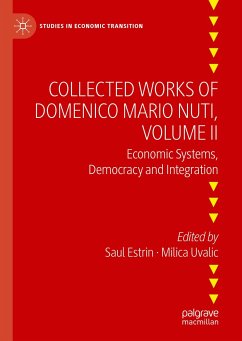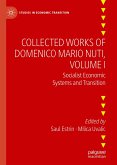This book, the second of two volumes, brings together the work of Domenico Mario Nuti to highlight his significant and varied contribution to economics. Bringing together works from across Nuti's career, his distinctive intellectual framework is exemplified in relation to discussions on the drivers of economic growth and development, the most efficient economic system, the organisation of firms, and how economies should be managed.
This volume gives particular attention to Nuti's views about how economic systems evolve, about the possibilities for various forms of economic democracy; and his analysis of East-West integration and globalization. The volume also contains a bibliography of his works.
Domenico Mario Nuti was Professor of Economics at La Sapienza University in Rome and the European University Institute in Florence. He also held positions at the University of Cambridge, University of Birmingham, and the London Business School.
Saul Estrin is Emeritus Professor of Managerial Economics and Strategy at LSE.
Milica Uvalic is Professor of Economics at the University of Perugia.
Domenico Mario Nuti was Professor of Economics at La Sapienza University in Rome and the European University Institute in Florence. He also held positions at the University of Cambridge, University of Birmingham, and the London Business School.
Saul Estrin is Emeritus Professor of Managerial Economics and Strategy at LSE.
Milica Uvalic is Professor of Economics at the University of Perugia.
Dieser Download kann aus rechtlichen Gründen nur mit Rechnungsadresse in A, B, BG, CY, CZ, D, DK, EW, E, FIN, F, GR, HR, H, IRL, I, LT, L, LR, M, NL, PL, P, R, S, SLO, SK ausgeliefert werden.
Es gelten unsere Allgemeinen Geschäftsbedingungen: www.buecher.de/agb
Impressum
www.buecher.de ist ein Internetauftritt der buecher.de internetstores GmbH
Geschäftsführung: Monica Sawhney | Roland Kölbl | Günter Hilger
Sitz der Gesellschaft: Batheyer Straße 115 - 117, 58099 Hagen
Postanschrift: Bürgermeister-Wegele-Str. 12, 86167 Augsburg
Amtsgericht Hagen HRB 13257
Steuernummer: 321/5800/1497
USt-IdNr: DE450055826
Bitte wählen Sie Ihr Anliegen aus.
Rechnungen
Retourenschein anfordern
Bestellstatus
Storno









